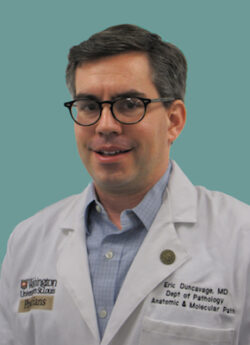Genetic and genomic testing is driving advances in precision medicine. Such testing provides the data that, when combined with information about disease status and environmental factors, enable doctors to move away from one-size-fits-all treatment plans to personalized therapies tailored to individual needs.
The Department of Pathology & Immunology at Washington University School of Medicine in St. Louis is reorganizing and expanding its genomic medicine testing services to take advantage of advances in genetic and genomic sciences and improve clinical care. Several new tests for cancer and inherited diseases are in the works. The department also is redesigning its website to make it easier for physicians to quickly identify the most appropriate tests for their patients.
As part of the reorganization, the department is establishing two new sections: a molecular oncology section, led by Eric Duncavage, MD, and an inherited diseases section, headed by Jonathan Heusel, MD, PhD.
“The School of Medicine has been at the forefront of genetics research for many years, including leadership in whole genome sequencing,” said Richard Cote, MD, the Edward Mallinckrodt Professor and head of the Department of Pathology & Immunology. “We have long had a major stake in translating these discoveries into clinically actionable tests to better define prognosis and treatment for a wide variety of diseases. We are delighted that Jon Heusel and Eric Duncavage, widely recognized for their research, are leading the effort to enhance the department’s genetic and genomic testing services.”
A wide variety of different mutations can give rise to cancer, and the specific mutations carried by a particular tumor affect its susceptibility to a particular treatment. These mutations also can be used to track a tumor during therapy to determine how it is responding to therapy. Clinical cancer genomics aims to use information on tumor mutations to help identify the therapies most likely to benefit the patient and avoid those least likely to help.

Duncavage and his Washington University colleagues recently developed a diagnostic test, ChromoSeq, for blood cancers, based on sequencing the whole genome. This comprehensive analysis has greater sensitivity than traditional testing, providing additional information that could help clinicians assess each patient’s risk of severe disease and choose the best treatment plan. The test was evaluated in a clinical trial of patients treated at Siteman Cancer Center, based at Barnes-Jewish Hospital and Washington University School of Medicine. Results of that trial were published in March in The New England Journal of Medicine. ChromoSeq whole genome sequencing for blood cancers will be available as a clinical test through the Department of Pathology & Immunology.
“Until recently, we could only analyze a limited set of genes or chromosomes because whole genome sequencing was too expensive for routine clinical use,” Duncavage said. “But recent advances in sequencing technologies and data analysis techniques have driven down the cost of whole genome sequencing in both time and resources. We showed that the technology could be used for blood cancers, and we are working on applying it to other kinds of cancers.”
In addition, Heusel and Duncavage are spearheading an effort to develop tests to identify people with an inherited predisposition to cancer. Most famously, variations in the BRCA1 and BRCA2 genes increase the risk of breast and ovarian cancer, but dozens of other genes have been linked to a range of cancers. In the interest of efficiency, the tests under development are based on sequencing only the 2% of the genome that codes for proteins. This tiny fraction of the genome — known as the exome — is where nearly all mutations associated with disease risk are found.

As chief of the inherited diseases section, Heusel will oversee the development and operation of tests for rare genetic diseases. Some of the people most in need of whole genome testing are babies born with mysterious ailments that appear to have genetic causes. Sequencing an affected newborn’s entire genome — and often the genomes of both parents, too — can be the fastest way to find an explanation for a baby’s condition.
Heusel and colleagues also are working on an improved test for disorders of somatic mosaicism, a group of conditions characterized by mutations in some cells but not others. Patients can have a wide range of symptoms, including overgrowth of one part of the body, such as the hand; skin spots or rashes; and abnormal tangles of blood vessels. The symptoms depend not only on what mutation has occurred but in which cells it has occurred. The researchers are building a faster, cheaper test that will allow more genes and more conditions to be screened.
“Genetic testing — particularly what we call next-generation sequencing, which involves sequencing dozens or hundreds of genes or whole exomes or whole genomes — it’s transforming medicine, transforming the way we understand the basis of disease, how to diagnose it and how to treat it,” Heusel said. “What we’re really trying to do in the department now is make it easier for clinicians to take advantage of all the new genetic and genomic diagnostic tools that are becoming available.”
Source: Read Full Article